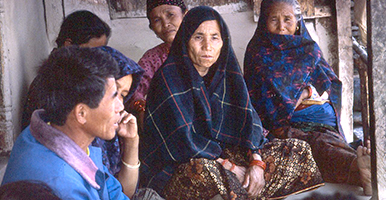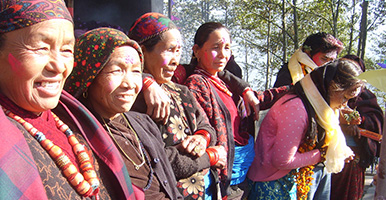Interviews with Nepali women in education
These interviews offer a unique opportunity to meet the truly inspirational women who are working to improve education in Nepal. We discover their backgrounds, their inspirations, what they have achieved and the challenges they have faced. We find out about their past and current work as well as their future plans.
Laxmi Keshari Manandhar
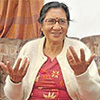 Laxmi passed her MSc in Botany from India and gained a Postgraduate Diploma in Women and Agriculture from the Netherlands. She has undertaken many training courses related to marketing, agriculture, rural development, and gender whilst working as a professor in Padma Kanya Multiple Campus T.U. As Head of the Central Department of Home Science and Women Studies she played a central role in introducing the women’s postgraduate diploma into the University. She is currently a retired professor and is the President of BPW Kathmandu.
Laxmi passed her MSc in Botany from India and gained a Postgraduate Diploma in Women and Agriculture from the Netherlands. She has undertaken many training courses related to marketing, agriculture, rural development, and gender whilst working as a professor in Padma Kanya Multiple Campus T.U. As Head of the Central Department of Home Science and Women Studies she played a central role in introducing the women’s postgraduate diploma into the University. She is currently a retired professor and is the President of BPW Kathmandu.
Download the interview with Laxmi
Lily Thapa
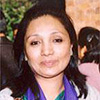 After becoming a widow at the age of 29, Lily Thapa, with the support of her mother, continued her education by studying gender in Sweden. She now lectures at Tribhuvan University but is better known for her work promoting the rights of widows in Nepal. She was the founder of Women for Human Rights in Nepal and won the Ashoka Fellow for the Best Entrepreneur Award in 2007 for her work in this field.
After becoming a widow at the age of 29, Lily Thapa, with the support of her mother, continued her education by studying gender in Sweden. She now lectures at Tribhuvan University but is better known for her work promoting the rights of widows in Nepal. She was the founder of Women for Human Rights in Nepal and won the Ashoka Fellow for the Best Entrepreneur Award in 2007 for her work in this field.
Download the interview with Lily
Angur Baba Joshi
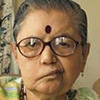 Angur was the first woman in Nepal to gain her Masters and law degrees and postgraduate qualification from overseas – at the University of Oxford – and was called to the Bar from Middle Temple, London. She also became the Principal of Padma Kanya Girls College, inspiring many students to pursue multidimensional personality development and their specific interests in education. She was the chairperson of many social service organisations including the Nepal woman’s organisation in Kathmandu and Tara Gaon Development Board.
Angur was the first woman in Nepal to gain her Masters and law degrees and postgraduate qualification from overseas – at the University of Oxford – and was called to the Bar from Middle Temple, London. She also became the Principal of Padma Kanya Girls College, inspiring many students to pursue multidimensional personality development and their specific interests in education. She was the chairperson of many social service organisations including the Nepal woman’s organisation in Kathmandu and Tara Gaon Development Board.
Angur is also an author of a number of books and articles. Now that she is retired from the active social service, she continues to write books related to spirituality, morality and purity in human thought, words and behaviour.
Download the interview with Angur
Dr Sumon Tuladhar
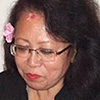 Dr Sumon Kamal Tuladhar has worked for UNICEF Nepal as an Education Specialist since December 2000. Before she joined the organisation, she was a Senior Research Officer. She also taught at Mahendra Ratna Campus, an undergraduate college within Tribhuvan University. With a blend of rich experience gained from research and work carried out at policy level at UNICEF, she has been able to contribute to educational policy with a gender and equity lens.
Dr Sumon Kamal Tuladhar has worked for UNICEF Nepal as an Education Specialist since December 2000. Before she joined the organisation, she was a Senior Research Officer. She also taught at Mahendra Ratna Campus, an undergraduate college within Tribhuvan University. With a blend of rich experience gained from research and work carried out at policy level at UNICEF, she has been able to contribute to educational policy with a gender and equity lens.
In 1986, she won a Fulbright scholarship to study at the University of Massachusetts, Amherst where she completed her doctorate in Education. Upon her return from study abroad, she worked as a liaison officer to the University of Massachusetts and Research Center for Educational Innovation and Development where eventually she established a Non-Formal Education Resource Centre in Nepal to support the NGOs who are working in the field of alternative basic education for school children as well as illiterate adults.
Download the interview with Sumon
Menna Acharya
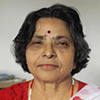 An economist, researcher, consultant and author, Menna is currently General Secretary of Tanka Prasad Acharya Memorial Foundation. Her research focuses on poverty, gender, macro economy, political structures and policies for equitable development. She has written many books and articles on Nepalese economy and gender, in both English and Nepalese. She has worked on engendering the Tenth Plan of Nepal and the Population Census of 2001, and Gender Auditing the Budgetary Process in Nepal. She obtained a PhD in Development Studies from The University of Wisconsin, an MSc in Economic Cybernetics from Moscow State University and a BA Honours in Economics from Delhi University. She has worked for many years in Nepal Rastra Bank (Central Bank) as Chief Economic Advisor and Chief Manager of the Development Finance Department (1966-1990) and for the World Bank from 1980-82.
An economist, researcher, consultant and author, Menna is currently General Secretary of Tanka Prasad Acharya Memorial Foundation. Her research focuses on poverty, gender, macro economy, political structures and policies for equitable development. She has written many books and articles on Nepalese economy and gender, in both English and Nepalese. She has worked on engendering the Tenth Plan of Nepal and the Population Census of 2001, and Gender Auditing the Budgetary Process in Nepal. She obtained a PhD in Development Studies from The University of Wisconsin, an MSc in Economic Cybernetics from Moscow State University and a BA Honours in Economics from Delhi University. She has worked for many years in Nepal Rastra Bank (Central Bank) as Chief Economic Advisor and Chief Manager of the Development Finance Department (1966-1990) and for the World Bank from 1980-82.
Download the interview with Menna
Harinder Thapalia
Harinder is the Chairperson of the Central Department for Home Science and Women’s Studies. Orginally from India, she moved to Nepal in 1968 after she was married. She is the first person to reach such a high position within the Padma Kanya Campus. She is able to make all the decisions for the campus and is able to give funds of her own accord. She also works with UNICEF on behalf on child rights.
"In my experience I have found that women do not understand what they are capable of themselves...I wish all women could get a chance to use their strong character and life so that they could step forward into a more positive environment. "


